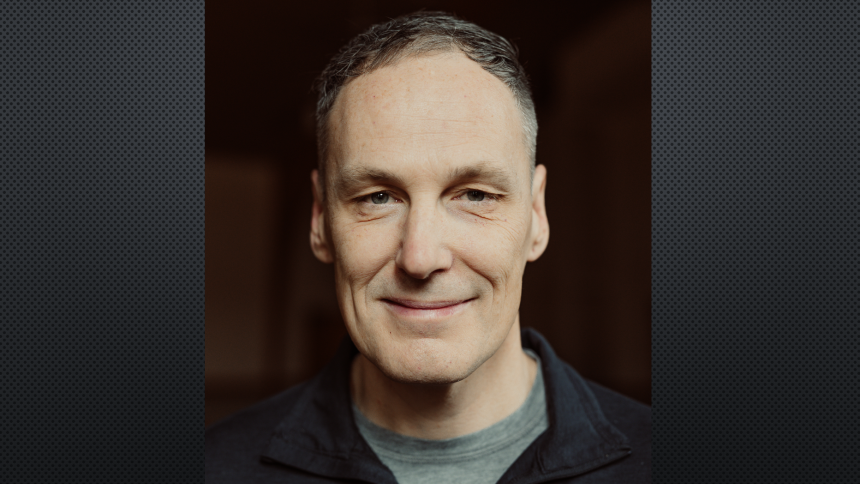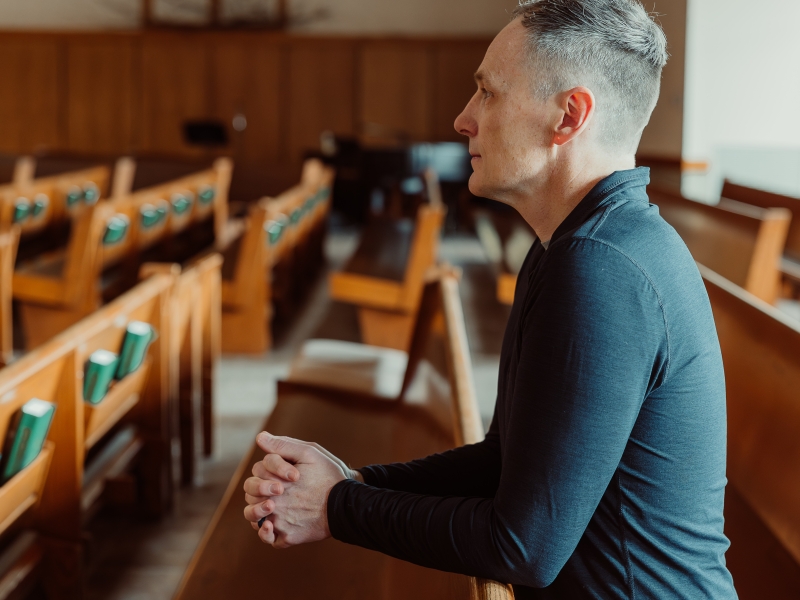
Jeremy Dowsett, pictured, is a cradle Catholic turned Protestant pastor who has now returned to the Church led by faith and reason. Read the story of Jeremy's remarkable journey, below, as told to writer Mary Gates:
Growing up attending Resurrection School in Lansing and attending Mass weekly with his family, Jeremy had a foundation deeply rooted in the Church.
“My family has very deep roots at Resurrection,” he says. “My great-grandfather and grandmother were first-generation parishioners, and my great-grandfather was on the building campaign team.”
But Jeremy also knew and loved people who lived outside the Catholic tradition.
“I had a certain amount of family history and Catholic formation in my childhood from birth,” he says. “But my dad was not Catholic when I was growing up, so we had a mixed household. My dad was sort of into Hinduism, and he didn’t go to Mass with us, so I knew some good people were not Catholic, good people who didn’t believe what we believed.”
Adolescence and a change of schools confused Jeremy, whose experiences led him to doubt his faith.
“Leaving Catholic high school was the beginning of the end for me because I had a better social experience in public school,” he says. “There were friendly, fun people who were not Christian and I liked them. That was the beginning of me questioning my faith.
“Having my dad as another example of a kind and good person who didn’t believe made me think that this stuff was not that important, so I developed a watered-down ‘we’re just supposed to be good people’ point of view.”
In high school and college, Jeremy continued to drift.
“I got caught up in the kind of sins that can be typical of teenagers, although I went to Mass every Sunday because that was a requirement in my house,” he says. “At that time, my dad and I passed like ships in the night; he converted to Catholicism and came into the Church my senior year of high school, and I was leaving.
“When I moved away for college, that was a time of exploration and trying to figure out what I believed. And during that time, drinking and partying led me further away from the Lord. I was never an atheist, but increasingly I just thought I should be a ‘good person’ and that was all that mattered.”
Midway through college, God broke into Jeremy’s heart in a way that would change the course of his life.
“At the end of my sophomore year, I developed friendships with some Protestant Christians who evangelized me, and I had a pretty profound conversion experience. I was convicted of the sin in my life and wanted to seek out Jesus in a real way,” he says. “It was very much a conversion — I woke up one morning and felt the Lord telling me, ‘Turn around today,’ and I did.”
The change, however, didn’t compel Jeremy to return to the Catholic Church.
“I did go to Mass a couple of times and to a Catholic Bible study, but this powerful conversion experience wasn't directed to anything other than Jesus, so I spent the rest of college trying to find some sort of community or tradition that made sense of that experience,” he says.
Exploring and seeking out a faith community after college graduation, Jeremy considered himself Christian but not Catholic.
“I got married outside of the Church immediately after college, and right away I had a sense that it wasn’t going well,” he says. “I knew I needed the support of a Christian community.”
After a friend recommended finding a Presbyterian or Reformed church, Jeremy looked in the phone book and went to the first Reformed church he found.
“It was evangelical, a great community where I learned about being a disciple. I ended up going on staff at that church as the youth minister, and I was interested in studying theology and learning Scripture, so I was doing that on my own time,” he says.
Feeling called to serve adults and invited by others to help start a new church, Jeremy attended seminary for the Reformed Church of America to become a church-planting pastor.
“The new church started from scratch, there were three couples involved in the beginning, and there was a lot about it that I loved.”
Despite leading a faithful Christian community with a missionary focus, and enjoying using his gift of preaching, Jeremy faced challenges when responding to church members who disagreed with his teaching.
“The thing that was challenging that began drawing me back toward Catholicism was the lack of tradition and authority and no way of adjudicating disputes — who gets to decide? In Protestantism, the one focus is the Bible, so I learned the Bible very well. In response to individual issues and conflicts, I learned to say, ‘This is what the Bible says.’ But not all matters could be effectively resolved in this way.
“And ultimately, Protestantism is not one tradition but many traditions — another church down the road says otherwise. The question of authority and how to resolve theological and moral disputes as a pastor became an issue for me, leading to my own theological crisis.”
Knowing Scripture well made Jeremy aware that the Catholic tradition was, in fact, scriptural.
“I knew that the Protestant stereotype that Catholic teaching isn’t biblical was wrong. As I prepared sermons and read different commentaries and authors, I relied on Catholic biblical scholars and the early church fathers' interpretations. I started quoting these people in my sermons, and then there was a point when I was actively reading Catholic sources.
“It was then that I felt convicted that I needed to investigate if Catholicism was the one true church.”
Once he read Pope Francis’s Evangelii Gaudium (Joy of the Gospel), the missing piece of the puzzle of Jeremy’s faith came into the picture.
“I read that document and knew Catholics were missionary and evangelical. That aspect of Protestantism had been the thing that kept me there, so there was no longer a reason for me to stay away from the Church.”
In 2015, after a decade as a Protestant pastor, Jeremy spoke with his board members at church, met with a Catholic priest, started attending daily Mass, and devoted the season of Lent to praying, fasting, and discerning.
“When I woke up each day I felt a tug to go to Mass,” he remembers. “I wanted to be there because I felt like the Lord was there and I wanted to be in his presence.”
On his way to attend a Catholic young adult ministry one night, Jeremy sensed a turning point in his life.
“I pulled into the parking lot and turned off my car and had an overwhelming feeling that if I went in, there would be no turning back. I called my brother, and I was sobbing on the phone.”
The practical realities of leaving his job as a divorced single dad of two sons and altering the course of his life made Jeremy unsure if he could take the step to return to the Church. Giving him the advice he needed to hear, his brother told him not to be afraid. “He said, ‘If you’re supposed to do this, it will be good. God will take care of you.’”
After telling the board of elders at his church that he was leaving, scheduling a confession, and going through the process of demitting as a Reformed minister, Jeremy immersed himself in the sacramental life of the Catholic Church.
“It felt very natural to be Catholic,” he says.
And while life was difficult as a single dad who was healing after a deeply wounding marriage, Jeremy found a way forward and a process of healing in God’s Church.
“I was hired as the facilities director at Resurrection after I gave up my job as a pastor, which was very helpful practically,” he recalls. “And the blessing of receiving a declaration of nullity of marriage, which so many people see as a hoop to go through, was one of the most beautiful gifts the Church has ever given me. To have people with the authority of Christ say, ‘You’re not wrong, this was not valid, your pain and suffering over that were correct’ — well, that was an enormous gift.”
After meeting and marrying his new wife, Mary, Jeremy began teaching at Powers High School in Flint.
He is completing a PhD in Catholic theology and serving as a liturgist and middle school theology teacher at Immaculate Heart of Mary in Lansing.
Jeremy says his story is one of God’s persistent, gentle love.
“God used his Church to minister to me, to say, ‘Yep, you’ve done the right thing. You are home.’”
* First published in the April edition of FAITH Magazine, the official publication of the Diocese of Lansing.

